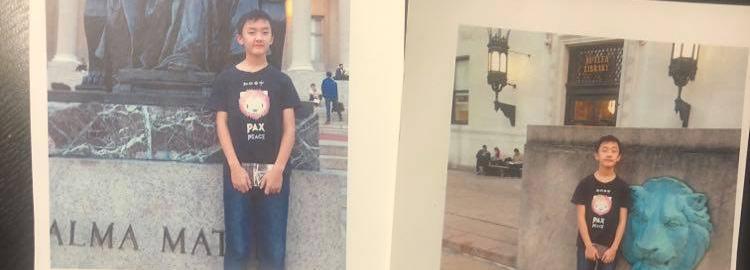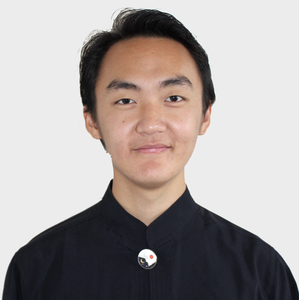Benefiting from Another’s Legacy
Kuang Wang CC’23 believes that in history, “we learn a lot about the ways that someone can be remembered ... in my mind, the best way to be remembered is as someone who loved their community and who loved giving back to it.”

Kuangye Wang CC’23 formed a connection to Columbia at a young age. Born in Xian, China, he came to the United States at 7 with his mother, who was studying for a master’s and Ph.D. in education and economics.
“I really grew up around campus,” says Wang, who often did his homework in the East Asian Library while his mother attended class. “I would study or take my scooter around the interior garden and go see the Scholar’s Lion sculpture, explore all of the hidden corners of campus and imagine being a student here one day, too.”
Wang was always aware of the high costs of college, especially for a single-parent family. “I started looking for scholarship applications very early on in the application process,” he says. “I knew that, due to my family’s financial situation, to attend a college like Columbia, I would need a substantial scholarship.”
Wang ultimately chose to apply early decision to the College, despite the risk of not receiving adequate financial aid. “I went all-in with Columbia,” he says, recalling how he filled out all the paperwork on his own. “The day I got in, the application portal opened up a video, and ‘Roar, Lion, Roar’ played at full volume. I couldn’t even believe it until the video said, ‘Welcome, Class of 2023.’
“When I saw the financial aid package the next day, that was an even better moment,” he adds. “If I didn’t get financial aid, I’d be in a lot of debt right now.”

With a major in history, specializing in East Asian studies and economics, Wang has discovered an interest in studying the past and in exploring his Asian heritage. Next year, for example, he looks forward to leading the student-run Columbia Journal of History, an undergraduate research publication that aims to promote intellectual inquiry and recognize outstanding historical literature on diverse subjects. “Being able to read these pieces with my peers is really rewarding,” he says.
Wang is also a performer with and treasurer of the Columbia University Lion Dance team. “For thousands of years, the Lion Dance has been a way for the Chinese people to express themselves. It’s an ancient form of martial art that is a link to our cultural heritage,” he says. Performing as the head of the historic lion costume, Wang and his team have danced not just at Low Library but also for restaurants and dance halls in Chinatown during Chinese New Year.
After graduating, Wang hopes to attend law school and eventually return to East Asia to practice law in human rights.
“In history, we learn a lot about the ways that someone can be remembered,” says Wang. “But I think in my mind, the best way to be remembered is as someone who loved their community and who loved giving back to it. With a scholarship, you have the potential to change someone’s life — not only that, but also to build a community of active young minds that are extremely eager and willing to give back to the people of their own communities.”
Will you help change a student's life?